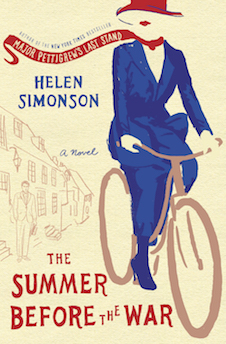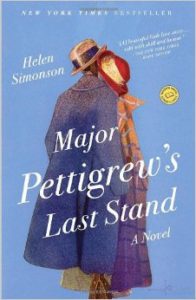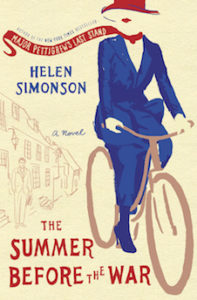
For this installment of Fiction Favorites and Awesome Authors I share with you an outstanding read by the bestselling author of Major Pettigrew’s Last Stand, Helen Simonson.

Her second novel, The Summer Before the War, set in the idyllic English town of Rye in 1914, is beautifully written and meticulously researched. Much of the tale is a social comedy of manners, an insightful, if subtle, exploration of gender and class, full of wit, humorous dialogue, and masterful characterization. The traditions and biases of the upper middle-class are juxtaposed tellingly against those of the servant classes, Gypsies, a spinster schoolteacher, and impoverished war refugees from Belgium.
In 1914, gender equality is advancing in baby steps. Simonson aptly illustrates the status of women with several well-drawn characters, most prominently Agatha Kent and Beatrice Nash. The indomitable Agatha, married to a well-respected civil servant, is one of two women on the local school board. She takes the revolutionary step of seeking the board’s approval to hire a woman, Beatrice Nash, as Latin instructor. Beatrice is an independent woman in her early twenties, nearly penniless after her father’s death, unable to make ends meet on a meager inheritance controlled by patronizing trustees. The teacher position is bread and butter to Beatrice, but this reality clashes with Agatha’s tenuous position in recommending her. Agatha warns, “let’s not mention any such awkward necessity” as money when seeking board approval—better to emphasize “teaching as a service rather than a profession.”
Another “awkward” subject is Beatrice’s desire to become a published writer. Agatha tells her to keep this yearning under wraps because it would be “an absolute disaster for a lady in your position to earn a reputation as a bohemian.” Beatrice has no trouble following this advice the first time she’s introduced to Mr. Tillingham, a renowned novelist in Agatha’s social circle. When the subject of female writers comes up, the arrogant and pompous author says he has received “several slightly hysterical requests to read such charming manuscripts” and “would rather cut off my right hand” than read them. He gives the manuscripts to his secretary “to compose her own diplomatic replies and to consign the offending pages to the kitchen stove.” Later on, a publisher sends Beatrice a condescending missive, rejecting her proposal to publish an analysis of her father’s work. Ironically, the publisher has decided to commission Mr. Tillingham for the project!

Agatha is childless but is close to her two nephews, Hugh Grange, a young surgeon, and Daniel Bookham, a poet. Growing up, the cousins spent summers and school holidays in the Kent household. Their chosen professions foreshadow later events during the war. In these characters, we see the personal turmoil wrought by social convention and judgment: in Daniel’s case, discrimination against homosexuality, and in both characters, the pressure to forge marital unions based on class and status rather than love and compatibility. The relationships between the cousins and with their Aunt Agatha are the highlights of the novel, believable and emotionally compelling.
In the first part of the novel, the townspeople live in polite denial of impending war, as hints and irony foreshadow tragic events on the horizon. When spoken of, the war is romanticized as a great adventure. The son of a nobleman joins the Royal Flying Corps because he doesn’t want to enlist in “an ordinary war” and thinks that flying airplanes is “damned good fun!” To complete his image, he shops at Burberry’s because “they do a very good aviator helmet with goggles.” Marriageable young women launch a recruitment brigade, shaming any reluctant young man into enlisting by handing him a white feather (symbol of cowardice), along with a subtle bit of sexual bribery: no offer of marriage will be accepted unless the man is marching off to war. For a proper sendoff, the town hosts a parade with a brass band, displays “model trenches” on the fairgrounds, and tops it off with a grand ball.
The last part of the novel takes us to the front, into the real trenches and a battleground hospital. A strength of the narrative lies in the gradual loss of innocence of the main characters, the contrast between the naivety of their grandiose expressions of patriotism and the tragic reality they ultimately experience. The novel also touches on divided loyalties of family and nationality when the German husband of a British woman is called home for military service. This is an intriguing theme that is so wonderfully explored in William Burton McCormick’s book, Lenin’s Harem, which I reviewed here on VBlog.
Fans of historical fiction are sure to love Simonson’s sweeping novel full of colorful characters, scintillating dialogue, and insightful exploration of relationships during an era of great social change. In this video [click here], the author aptly sums up the major theme: the book is ultimately about “what you think is important to build in your lives, what remains when everything is falling apart, and more specifically, what is destroyed by war and what is burnished in the fire.”
And now, I welcome Helen Simonson to VBlog. Thank you for joining me, Helen! I loved The Summer Before the War, and Major Pettigrew is now on my ‘to-read’ list.

From a writer’s perspective, I have a few questions I’m dying to ask you, especially because our writing processes are apparently so different. In your videotaped presentation, you mentioned, “I don’t write what I know—I write to ask questions and explore them and hope to find some answers for myself.” The historical setting for your characters required painstaking research, yet an intuitive knowledge of human nature and social interaction underlies your characterizations. Do you feel that you write what you “know” on an emotional or personal level?
I try to write about the characters in my head and they seem to be real people to me. What is funny is that on an emotional level I can see that I am using my characters to work out things that puzzle me about the world and about how we treat each other. Social comedy as moral philosophy? I do also have great fun slipping in small personal details—like my grandfather’s name or a house I’d like to own in Sussex—but I am not writing autobiographically. I think books are wonderful because they allow us to travel to places we cannot go. Writing a book is no different; every page is a new adventure for me.
You also mentioned that you don’t write an outline of the story first but create the characters and let them lead you where they want to go. Did you have a broad sense of the plot when you started out, or was this story a complete adventure of discovery along the way?
Simply following the characters around is a frightening way to write a work as long as a novel. But now I’m in the midst of a third novel I have no idea where I’m going—again! With The Summer Before the War, I knew World War I was coming but I did not know how we were going to go there. It was a great relief to realize my surgeon, Hugh, would go and I could simply follow him to the hospitals and trenches of the Western Front. I don’t recommend my way of writing but it forces one to noodle about, leaving room for literary themes to arise and be explored. If I had a plot outline I’m afraid I might rush along too fast.
I wonder if you can place yourself in Beatrice’s shoes and imagine what it might have been like to face the prejudice against female writers, as depicted by the character Mr. Tillingham and the publisher that rejected her project. Given your evident talent and love of writing, do you think you would have been daunted in such an environment or would have persevered?
The more I wrote about Beatrice the more I wondered if we have really come as far as we thought in terms of women being free and equal. The pay gap and the #metoo movement suggest we are still fighting for basic respect. I would have been daunted then and I’m still daunted now. No writer I know has escaped rejection, and since writing is an act of great vulnerability it can be very painful. It was not hard to imagine Beatrice’s hurt. Just the term ‘female writer’ carries its own put-down. I was thrilled to discover, in taking intermediate French conversation lessons recently, that the French word for writer doesn’t carry a pronoun. There is no ‘le’ or ‘la’ so in French I am fully a writer—Je suis écrivain. It feels good!
And it feels good to read your work! Thank you for this insight into your writing, Helen. We look forward to your next novel!
